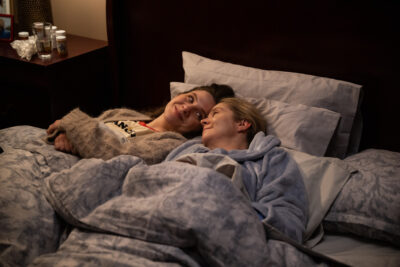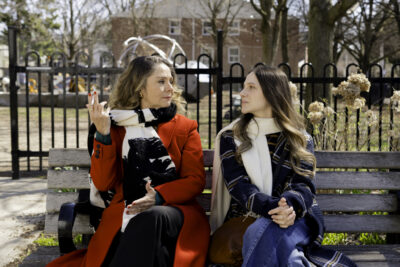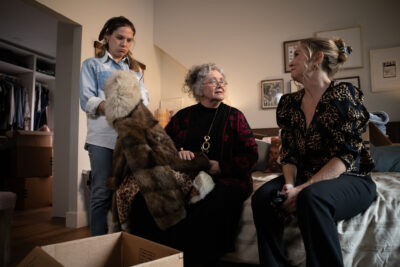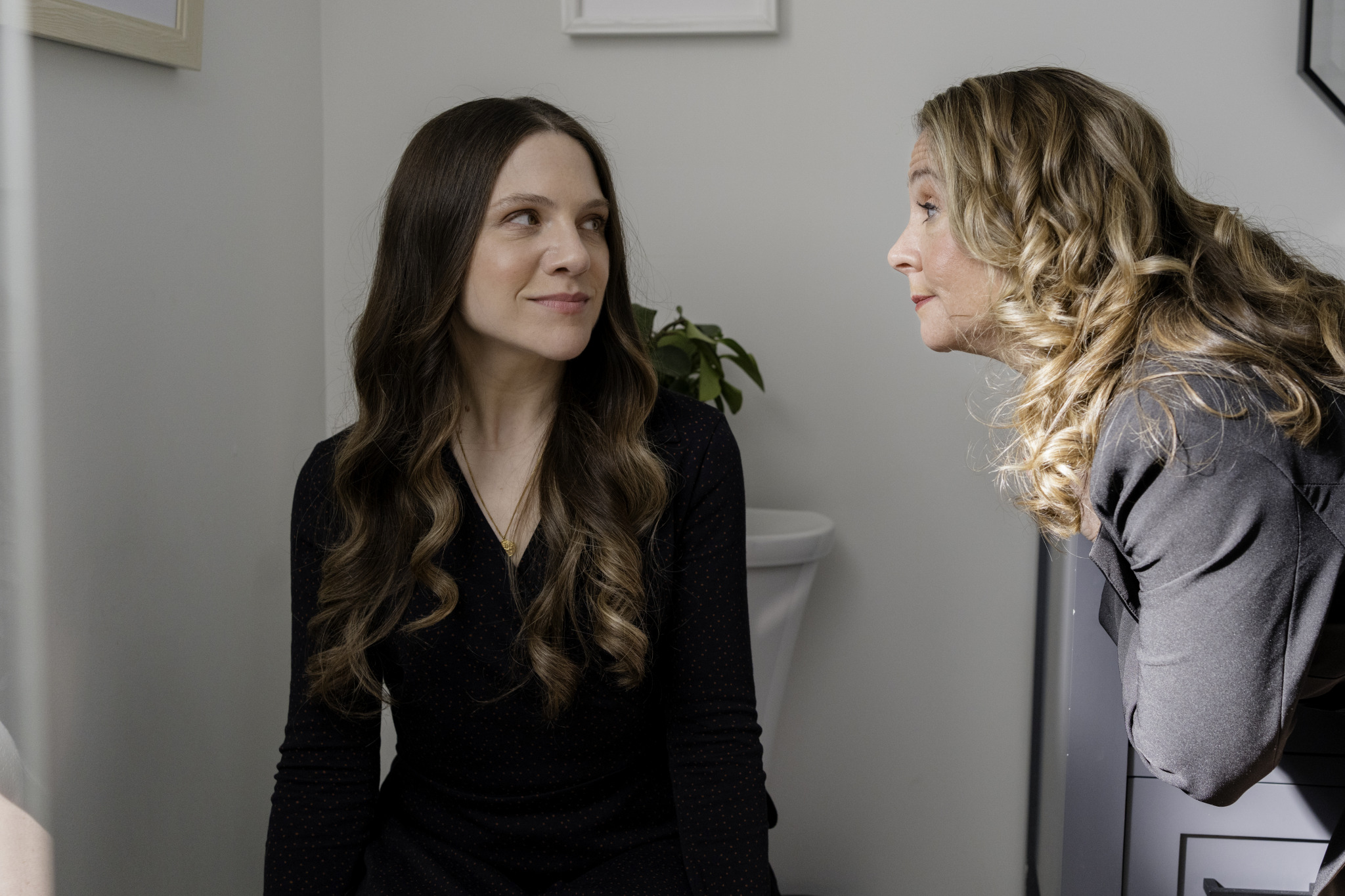Grief is a complicated emotion that affects different people in different ways. For Toronto-based screenwriter and producer Wendy Litner, humour was a coping mechanism to navigate her mother’s death.
In fact, she has always found a sense of comfort in laughter and cracking jokes. A few years prior, Litner relied on comedy to power through IVF treatments, sharing her journey on screen with CBC Gem’s How to Buy a Baby. Now, she is once again using a lighthearted approach to discuss a heavy subject matter as creator of the new Crave original My Dead Mom, which unpacks her first-hand experience with loss.
The short-form series, directed by Chandler Levack, focuses on Emmy (Degrassi’s Lauren Collins), who is still grieving her mother Fern (Megan Follows) three years after her passing. Everywhere she goes, her mom’s presence lingers, as well as her criticism of Emmy’s outfits, choice of lipstick, and even the way she makes bread. Although her boyfriend, siblings, and coworkers all think it’s time for her to move on with her life, Emmy doesn’t feel ready to say goodbye to her mom yet.
Over the course of seven episodes, viewers can’t help but laugh and feel drawn to Emmy and Fern’s complex relationship, filled with both bickering and tenderness. In a conversation with SheDoesTheCity, Litner shared more about how her mother inspired Follows’ feisty but remarkable character, why she believes comedy helps make sense of pain, and what she hopes audiences understand about grieving timelines.
I attended the premiere last week and truly enjoyed the show. During the Q&A, I found out that you met executive producer Lauren Corber in law school and that both of you decided to change career paths together. How did it feel to collaborate with her again in the making of My Dead Mom after How to Buy a Baby?
It’s been so special, especially because we did go to law school together. I just loved collaborating with her so much the first time, and then to be able to do it again is just such a special joy. There’s a character in the show that’s also a lawyer, so I felt like she could appreciate the law jokes and the lawyer not wanting to maybe be a lawyer anymore.
How to Buy a Baby was based on your own experience with IVF treatments. You captured a lot of the hardships of that journey through comedy and similarly, in My Dead Mom, you address grief in a humourous way. Why do you think comedy is the perfect vehicle to talk about these heavy topics?
It’s the only way I know to deal with difficulty. My only coping mechanism is being able to laugh. I especially honed it during infertility and having to be at the fertility clinic first thing in the morning, and I couldn’t help but just find the humour in it. Even when my mom was dying, she was hilarious. If cancer couldn’t take away her sense of humour, then death shouldn’t either.

In My Dead Mom, Emmy has been dealing with the loss of her mother for years, and many people don’t understand why she hasn’t moved on, including her boyfriend and her siblings. Can you talk about the decision to not set the series right after the funeral?
When I was writing the scripts, a lot of the questions were like, “why isn’t it right after her mom died?” It was so important to me to show how long grieving takes and what it looks like. I mean, my mom’s been dead for a decade, and I’m still sort of grasping at ways to grieve her and honour her, just sort of fumbling through it.
I wanted to have it where it’s a few years out, where people are sort of asking that question, and show that there’s a bit of an embarrassment. There’s this understanding right after someone dies, but then how long does that last? You can grieve in your own way, even if it takes longer than a year. We sort of come up with these notions of stages and timelines.
Mother and daughter relationships are very complex, and we see that through Emmy and Fern’s interactions. Whenever Fern shows up next to her daughter, she often criticizes her decision-making. But there are also moments of tenderness between them. Was it hard to balance the bickering and the love between these two characters when writing the scripts?
I wanted it to have both, because I realised that with my mother. It’s easy to remember some of the things our mothers have said to us that we don’t like, but then when you actually step back and look at it, there was so much love there. That’s where the difficulty in relationships come from.
I remember my friend had pictures of her and her mom from a photo booth at the mall, and my mom and I were never that kind of mother and daughter. I always felt a little bit of FOMO, a little bit of jealousy around that. There’s other mother-daughter paradigms that are a lot snippier, sharper, and might feel a little more dysfunctional, but it doesn’t mean that there isn’t love there.

You are also a producer on the show, so you had a say in the selection of cast and crew. What drew you to choosing Lauren Collins and Megan Follows to play the leads?
It’s so hard to find that line between comedy and sadness, so that was something I was really protective of. They’re both absolute queens, so for them to come on was just so exciting. I thought that they both encapsulated that so well. Lauren was able to have this vulnerability, but also this amazing strength to her that I just loved. She was so game to get in the mud and do it all. I was so moved by her spirit and just by the incredible person that she is, and she brought so much of that to the character.
Megan is just unbelievable. Her sense of comedic timing is just unbelievable. She was so strong and fierce, but also shifts on a dime too. I had to remind myself that Megan wasn’t my mom and that she wasn’t going to adopt me at the end of this.
That’s hilarious! And what was it like to work closely with Chandler Levack, who directed most of the episodes and helped to bring such a personal story to life?
It’s always so fun for me and meaningful to bring on collaborators and to see it through their eyes as well. It always elevates the material. There’s a bit of nervousness, of course, because it’s so vulnerable. I have a very specific tone in mind, so when you start working with someone, I just hope that they’ll feel the same way about the tone. Chandler absolutely did, and she directed things so brilliantly and so beautifully. For her to bring her beautiful heart to the project meant so much. It’s always incredible to collaborate with amazing women.
One of my favourite episodes of My Dead Mom is “Shana Tova”, because it shows how some of the hardest moments to reckon with grief are during family gatherings. Why did you choose Rosh Hashanah (a Jewish holiday) to capture Emmy’s inward struggle?
I had Rosh Hashanah dinner with my brothers, and I remember saying to them, “gosh, I miss mom so much.” And then we were like, “but dinners were horrible”. We were just laughing about how you miss everything about it, and would do anything to be able to live one more night of that again. I wanted to show that. I’m Jewish, so to be able to show a Jewish dinner that we don’t often see on TV was important to me.
I find myself particularly during the holidays where I’m like, “oh, I missed this dish that my mom used to make, and I don’t know how to make it”. That’s sort of the sharpest time that we miss our loved ones.

I would also love to talk with you about the props and wardrobe choices, and the sentimental value that they carry for Emmy. Was there a particular item included in the series that reminded you of something your mom left behind and that you kept?
Oh, that’s such a beautiful question. I love wardrobe. I find it so exciting and I love that you can just telegraph something so visually. My mom had these leather driving gloves that were always too fancy for me to ever wear. The way she put them on felt so romantic, so I have a pair of my mom’s gloves. We used fresh ones (in the show), but that really excited me.
This isn’t one of my mom’s, but my husband has this hockey jacket from high school that says “Thornhill” on the back, where Lauren Collins and I both grew up. It felt like a fun little nod to him to have that in the show.
Lastly, the series made me laugh and also felt so relatable. What do you hope audiences take away from watching My Dead Mom?
I hope that people take away that laughing is an absolutely valid way of dealing with pain, and it’s a valid coping mechanism. I also hope that they take away that grief isn’t linear, and it takes as long as it takes. I hope that they also just feel that it is a celebration of family and that losing a parent, doesn’t mean there aren’t other love stories to have.
All episodes of My Dead Mom are now streaming on Crave.




 Follow Us On Instagram
Follow Us On Instagram
